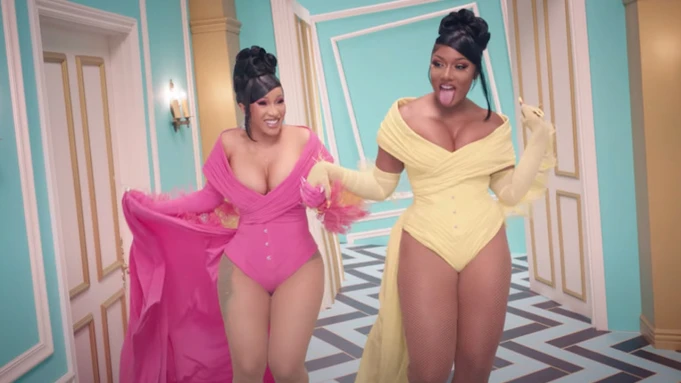Respectability Politics in the Music Industry

Still from “WAP” music video by Cardi B and Megan Thee Stallion
Image description: Cardi B (left) and Megan Thee Stallion (right) strut down the hallway of an extravagant and whimsical mansion hand-in-hand.
Music is seamlessly integrated into our lives: light classical music drifts in the background while you’re eating penne pasta at Epicuria; mainstream hip hop plays in the Uber after a day at Santa Monica; mellow R&B provides the perfect ambiance for doing homework in your dorm. With a multitude of genres, music acts as a comforting and empowering presence that can heal, restore, and galvanize. For many of us, music is so valuable that we each pay over a hundred dollars a year to consume it: last year, domestic music streaming services from Apple Music, Spotify, Amazon Music, and many others generated $10.1 billion in revenue.
However, the music sphere is so much more than the sparkles and glamour that it attempts to convey in the media. The multibillion dollar industry that we love and consume actually capitalizes off of misogyny, racism, and queerphobia.
Negative attitudes towards female rappers, as exemplified through the refusal of many male UCLA students to attend Bruin Bash because of Rico Nasty, are not a one-time occurrence or special case scenario. The music industry has long profited off of sexualizing women in male-produced music but tearing down women who embrace their sexuality in their own music. In an interview with People Magazine, American record producer Jermaine Dupri refused to name his favorite female MC because according to him, contemporary female MCs are nothing more than “strippers rapping.” Ironically, Dupri has worked with Migos, a male music group who released a song in 2019 dedicated to their love for strippers.
These sentiments were further reinforced by conservative commentator Ben Shapiro when he critiqued Cardi B and Megan Thee Stallion’s viral hit, “WAP,” in 2020. As he recites the lyrics with stilted and painfully awkward discomfort on “The Ben Shapiro Show,” he interjects to disapprove of the song’s overarching message. Shapiro’s comments, even if they were later turned into a meme, spread the toxic narrative that female rappers’ straightforwardness about sexual health and bodily autonomy was setting back the feminist movement. This perspective has inadvertently become inundated into the music industry, as many male celebrities such as Kanye West renounce female-produced music for its feminist-centric nature but also encourage misogynistic perspectives.
Patriarchal standards are amplified for women in the music industry, thus constantly pitting them against each other. Interestingly, the Madonna-whore complex, a term coined by Sigmund Freud in the 1900s, has been reflected in pop music rivalries throughout history. The complex describes a psychological dichotomy of women between being loved or sexually desired but never both, and can be observed between Taylor Swift and Katy Perry. Although their conflict is now resolved, the two pop artists once engaged in a very public and long-standing feud from 2012 to 2019. Interestingly, their disagreements began when Perry hired Swift’s background dancers out from under her, yet their dispute was only prolonged through escalating passive-aggressive comments over social media. Fans felt pressured to side with one or the other, and accordingly associated the “Madonna” role to Swift and “whore” role to Perry. The corresponding media fight between their separate fanbases reflected the virgin-whore stereotypes Freud hypothesized over a century ago. In a broader spectrum, this notion of a “girl fight” is one of pop culture’s favorite and most diminutive phenomena. It trains women in the music industry to believe that their fame has a prescribed shelf life and other women should be viewed as threats to their success. This forced dichotomy can be observed throughout history with a number of female artists: Lady Gaga vs. Madonna, Britney Spears vs. Christina Aguilera, Cardi B vs. Nicki Minaj. Rooted in sexism, much of the drama between famous artists normalizes pitting women against each other.
Sexism in the music industry also overlaps with structural racism. A recent study conducted by Black Lives in Music revealed that 88% of Black music professionals have faced barriers to their career progress in the form of “direct or indirect discrimination, overt racism, and microaggressions.” Therefore, even if we see Black artists on the charts and in awards ceremonies, we must stay cognizant of the obstacles they overcame and consider the many other smaller Black artists that are still battling to be heard and respected. Specifically for Black women, the phenomenon known as misogynoir (anti-Black misogyny) has disparaged a number of black artists such as Megan Thee Stallion and City Girls. The racist stigmas surrounding Black women portray them as unattractive, deficient, hypersexual, and unhealthy; these have in turn set up even more roadblocks for aspiring Black women in the music industry as their music and life experiences are continuously vilified by white higher-ups.
Queerphobia is yet another underlying issue embedded in the modern music scene. In the past, record producers and music labels have been notorious for choosing a “poster queer” for a certain period of time, such as Troye Sivan, Halsey, girl in red, and Clairo. The music industry recycles this pattern of having diversity, but only to an extent. Let’s face it: they don’t want much more than the token gay. Although it is crucial to amplify queer voices in an industry that capitalizes off of silencing them, we must also overcome the “emblematic gay” narrative dominating music and normalize queer music professionals and queer narratives in music.
The modern music industry upholds a culture of hypersexualization, misogyny, and underrepresentation, and the only thing we as a music-loving and consuming community can do to work against this is to hold ourselves accountable. So the next time you open your Spotify or Apple Music playlists to play something, listen. Really listen.




